Celebrating Mongolian Women's Resilience and Leadership
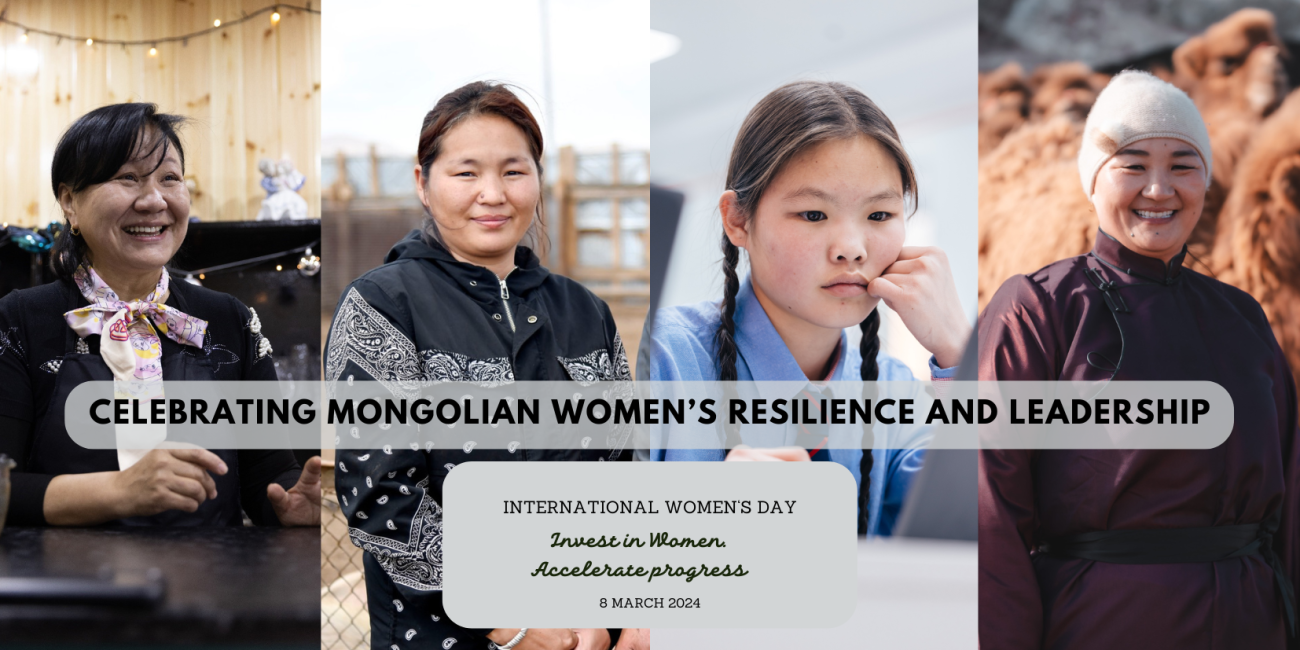
Mongolian women lead in economic growth, innovation, and social progress. Their resilience, leadership, and creativity shape a more inclusive society.
On the occasion of International Women’s Day 2024, the UN Mongolia shines a spotlight on some outstanding women and girls who have demonstrated resilience, dedication, and leadership in Mongolia. The UN Mongolia is proud to stand with them as they embark on the journey to overcome the hurdles ahead and strive for a better future, not only for themselves but also for the communities and societies they are a part of.
Breaking the vicious cycle of gender-based violence
Meet Ms. Bolor (her name has been changed for her safety), who bravely escaped with her three children, aged 2 to 12 years old, from her abusive husband. She found much-needed refuge in a haven where she was welcomed with the reassuring words, "You are safe here." At the one-stop-service center, Bolor and her children received not only warm shelter, food, and clothes but also psychological support as she coped with the physical and mental traumas from her abusive marriage.
Bolor is one of thousands of women who not only find shelter but also receive assistance to break the cycle of violence at One Stop Service Centers/shelters. Here, in addition to ensuring their safety, the government offers seven types of services, including primary health care, social and psychological counseling, and legal services.
Thanks to the eleven One-Stop-Service Centers established between 2016 and 2023 within the project "Combatting Gender-based Violence in Mongolia," implemented by UNFPA in cooperation with the Ministry of Labor and Social Protection and with the support of the Swiss Agency for Development and Cooperation, survivors of gender-based violence receive protection and safety and find the courage to rebuild their lives. More than 90% of women visiting the One Stop Service Centers/shelters come with their children, and as of 2023, 3037 out of the total 4037 service receivers from the Centers were minors. UNFPA Mongolia continues to provide professional training and necessary support to the One Stop Service Centers/shelters’ staff in gender-based violence prevention, protection, and GBV risk mitigation.
Empowering women with entrepreneurship skills
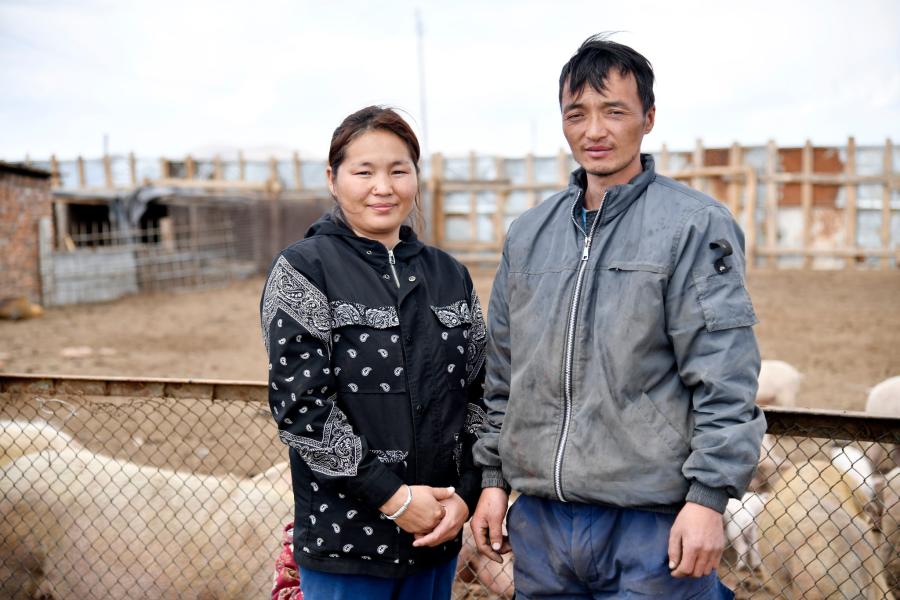
Meet Ms. Nomin, a pig farmer and mother of five who recently migrated from Tuv province to Nalaikh district in Ulaanbaatar. Rebuilding her life in a new land alongside her husband and children was no easy task. They purchased a small plot of land, where they built their house and a pigsty, embarking on a journey they never imagined they would undertake.
The idea of starting a pig farm dawned on Nomin during the COVID-19 pandemic. Amid the prolonged lockdown in Mongolia, the government provided each citizen with 300,000 MNT to mitigate the pandemic's impact. With this assistance, Nomin's family purchased four piglets and a young hog in 2021. Today, they care for 50 pigs.
Nomin continually sought to improve her pig genetics with high-quality breeds, aspiring to modernize her farm into a commercial enterprise. Expanding pigsties, enhancing water supply, planting vegetables, and installing fencing signify her commitment to advanced farming practices.
Despite her efforts, Nomin was yet to become the entrepreneur she envisioned. In March 2023, she joined a “Shudarga Dens” Tuv NGO project supported by IOM Mongolia, which aimed to assist migrant women's businesses. Through entrepreneurship training, she qualified as a top participant, earning a grant. With this support, she acquired essential equipment like a meat saw and vacuum packing machine, expanding her business.
Equipped with new tools, Nomin has transformed her pigsty into a successful business, boosting her family's income. She aims to expand her pig population, produce meat products, and increase sales. Benefiting from IOM Mongolia's project, she now processes and vacuum-packs meat, enhancing their income and meeting the demand for quality meat in urban and rural areas.
Investing in women herders and developing a niche camel-milk value chain
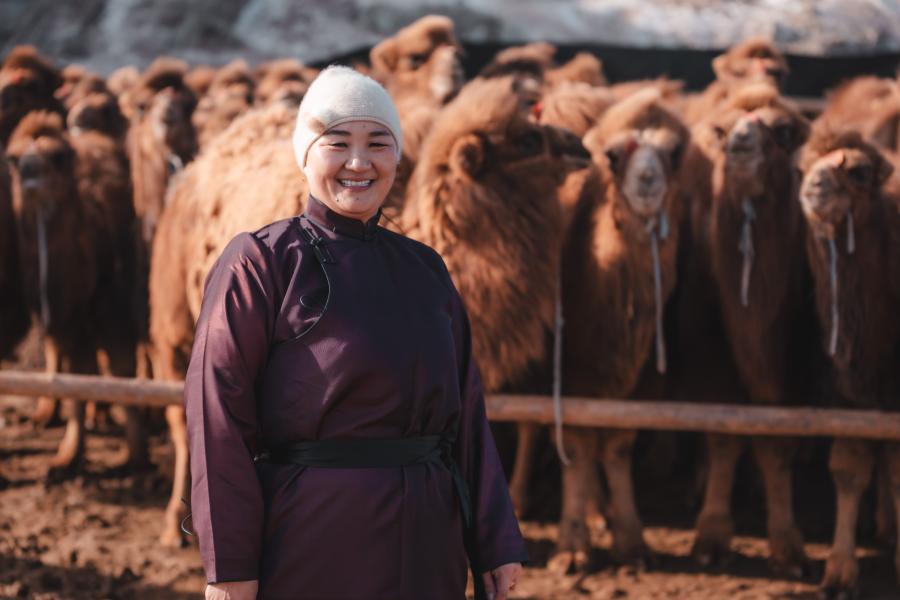
P. Munkhdul is a dedicated camel herder living in the Dundgobi region. She and her family tend to a herd of 400 camels. Embracing innovation and community support, Munkhdul became a member of the first camel herders’ cooperative established through the SDG-BE project, funded by EU and implemented by FAO, ILO and UNDP. FAO aims to develop the camel-milk value chain and uplift local camel herders by connecting them with the private sector. Munkhdul contributes her valuable camel milk to this chain, enhancing the local economy and sustainability.
Munkhdul's journey into camel husbandry began in her youth. Initially, she perceived camel milking as a daunting task that demanded considerable physical strength and dexterity. However, years of experience have honed her skills to perfection. Her efforts culminated last year when she supplied an impressive 20 tons of camel milk, earning national recognition for her achievement. "It feels great to be acknowledged for my work. In addition to milking, I also produce over ten different dairy products from camel milk so that my family can enjoy this healthy food," Munkhdul shares. Acknowledged for its nutritional benefits, camel milk has been the focus of various studies, underscoring its importance to both health and heritage.
Bridging the digital divide - reaching remote areas with digital skills
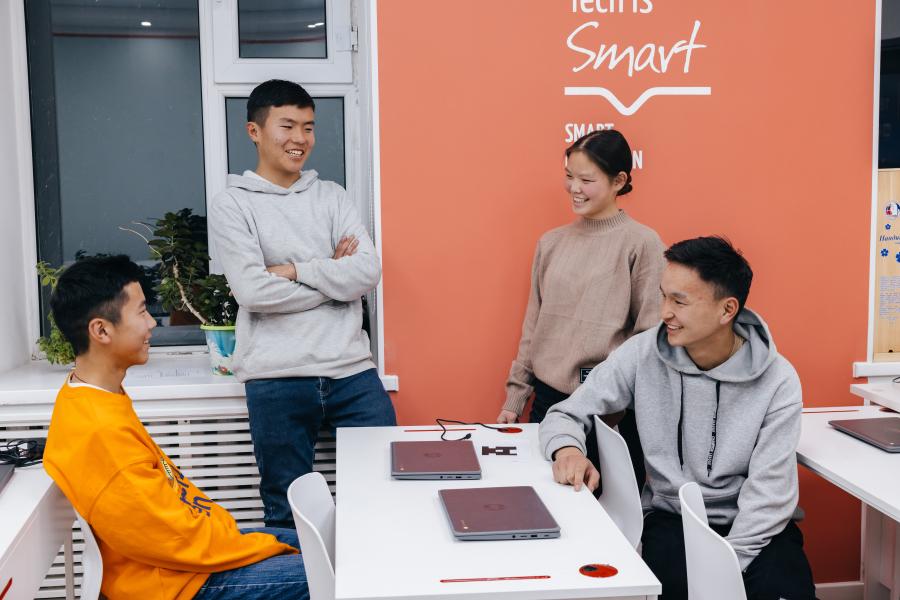
“I will be a software engineer!” says Bujmaa, a 15-year-old girl from Khankh soum, Khuvsgul province – a small community over 1000 km away from the capital city. “Even though I am a girl, I have big dreams to write codes and create software and applications”.
A Bujmaa is one of the few girls in the ICT club established for the first time with UNICEF support at secondary schools in Mongolia to enhance students’ extracurricular activities. During the pandemic, many children across Mongolia especially those from remote areas like Khankh were unable to access distance learning due to a lack of access to technologies and/or the ability to beneficially use those for extracting information and facilitating knowledge.
To support children with their digital skills and provide equal education to all, UNICEF partnered with the leading mobile operator Mobicom on the “Smart Education” initiative. The company helped establish digital classrooms with better internet connection in eight schools across Mongolia.
UNICEF brings, through the School for Asia initiative, trainings on digital literacy skills, hybrid teaching methodologies and the use of technological devices and development of digital contents for teachers and children from secondary schools in these classes. Mongolia considers digital transformation as a critical means to accelerate progress towards Sustainable Development Goal (SDG) 4 and sees UNICEF as one of the strategic partners in this area.
Redefining Leadership: Beyond Gender Stereotypes
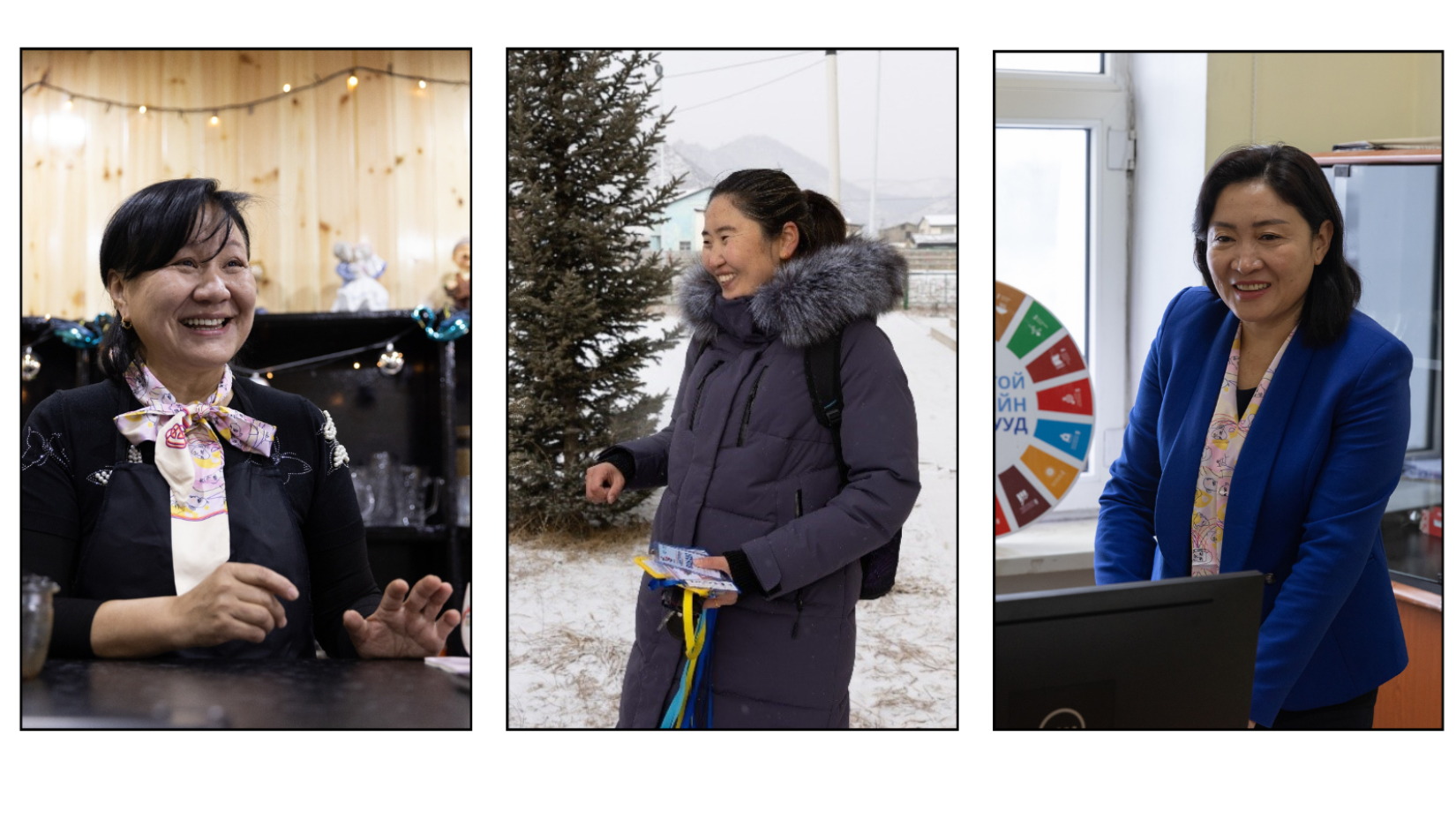
Meet three women, B. Battsetseg, B. Tserenlkham and B. Oyunbileg, who dare to challenge gender stereotypes and champion their peers in leadership.
In Mongolia, grassroots initiatives are actively working to challenge age-old patriarchal values and norms that perpetuate gender-based stereotypes mainly focused on the capital city. One of such initiatives responding to this need is Women’s Leadership Network of Mongolia (the Network), a nationwide grassroots movement with almost 2,000 members supporting each other across political affiliation, initiated under UNDP’s project funded by the Korea International Cooperation Agency.
Joining the network, more and more women are believing in themselves, dismantling the gender stereotypes imposed by men on women, says B. Battsetseg. “We encourage a shift in the attitudes of women themselves.”
“Through the Network, I am gaining confidence as a leader along with change in my perceptions towards politics,” says B. Tserenlkham.
B. Oyunbileg wants more women to support and encourage one another when they decide to pursue a leadership role instead of casting doubts about their abilities or concerns about family and reputation.
The Network is among a number of initiatives being implemented with support from the project. The project also provided substantial support to Mongolia in adopting a 30 percent gender quota in the 2024 elections, followed by a 40 percent quota in 2028 in its Election Law from 20 percent. This legislative change opened doors to many special measures such as zipper list, waivers of nomination fees effective changes in promoting women’s political participation.









